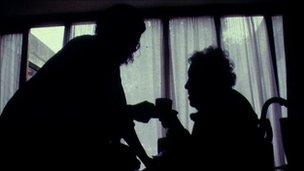Home care workers 'not properly vetted'
- Published

Care Minister Norman Lamb said there was "a clear system that holds providers to account"
More than 200 home care providers in England have been using staff who have not been properly vetted, the BBC's Inside Out programme has found.
The firms may have failed to carry out criminal checks or ensured workers were not barred by professional bodies.
A Freedom of Information Request showed the Care Quality Commission saw the staff as not "appropriately qualified".
Care Minister Norman Lamb said it did not show "the whole system" totalling about 6,000 operators had failed.
The Care Quality Commission supplies care operators with guidance, external on "suitability of staffing" to ensure they comply with the standards demanded by the Health and Social Care Act 2008.
CQC requirements relating to workers require home care providers to have effective recruitment and selection procedures; to carry out relevant checks when they employ staff; to ensure staff are registered with the professional regulators where necessary, and to refer staff who are thought to be no longer fit to work.
The commission - which regulates home care in England - told the BBC its inspectors had found 217 companies employing workers without making sure they were properly qualified as defined in its guidance.
The CQC's figures also showed dozens of people with criminal records, who were working unsupervised as carers in people's homes, had not been risk-assessed.
CQC guidance states that carers who might pose a greater risk to vulnerable people - perhaps because of previous convictions - need to be risk-assessed in order to judge their suitability.
A Care Quality Commission spokesman said: "If a criminal records check discloses a conviction or other relevant information, the employer has to decide whether the person is suitable to be employed in their service.
"The organisations providing care service need to risk assess their staffs' suitability for the role, considering what information they have on the individual, if they have a criminal conviction, how old and relevant it is, the role and activities the person would undertake and the characteristics and needs of the people using the service.
"Providers should make decisions in the context of their responsibility for the well-being of the people who use the service."
Care Minister Mr Lamb described the findings as "deeply disturbing" and said care providers "obviously" needed to be held to account by the Care Quality Commission.
But he stressed individual failings did not mean "the whole system has failed."
"Inevitably, in all walks of life sometimes things go wrong," he added
The Department of Health said it was the responsibility of individual providers to employ suitable staff.
Aiden Cotter, coroner for Birmingham and Solihull, called for independent monitoring boards - like those used in prisons - to be used in the care industry to protect older people.
"I don't think the government could ever afford to pay for the type of supervision that's necessary but it could be done by a voluntary organisation such as the Independent Monitoring Board," he added.
Inside Out looks at some radical solutions to the problem of funding elderly care in the future on BBC One at 19:30 BST on Monday
- Published15 October 2012
- Published15 October 2012
- Published15 October 2012
- Published15 October 2012
- Published15 October 2012